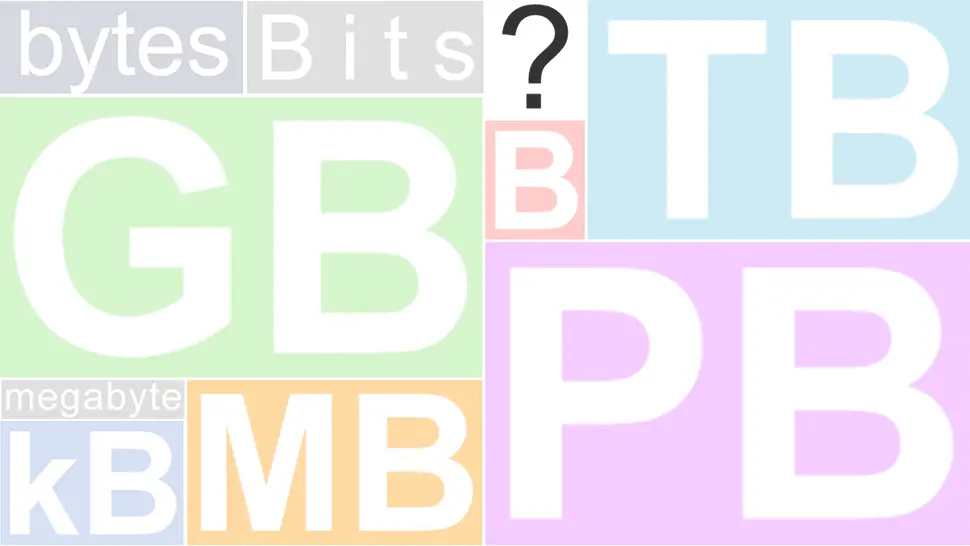Today I would like to demystify bits, bytes, and explain why there are sometimes large differences between an advertised devices’ capacity, and the capacity that same device displays in Windows and other operating systems. I will also explain the difference between kilobyte, kilobit and kibibyte.
If you just want to convert a kilobyte to another value (megabyte, megabit, gigabyte, gigabit etc.) then use the Bit Converter further below, but if you want to learn about bits and bytes and their multiples, then read on!
Contents
- Kilobytes, megabytes, gigabytes
- Kilobit (Decimal, Metric)
- Kilobit / kibibit (Binary, JEDEC / IEC)
- Bit, byte, kilobyte conversion charts (PDF)
- Bit Converter
- Conclusion
- Further Reading
Kilobytes, megabytes, gigabytes
First, let’s get some things out-of-the-way. Bits, bytes and their multiples are a very confusing issue, and I have tried very hard to lay everything out in an as-easy-to-understand way however, this isn’t easy, it’s hard (at first anyway). It certainly doesn’t help when manufacturers use the wrong terms to describe their product capacity (not kidding).
Now let’s get straight into the different definitions of a kilobyte, which varies according to the standard being used.
Kilobyte (Binary, JEDEC)
A Binary kilobyte is a digital information unit that is a multiple of a byte, specifically: 1 kilobyte (KB) == 1024 bytes (B). In the Metric system, kilo means 1000, so using the term “kilo” in this context has caused much confusion. It gets even more confusing when hardware manufacturers of storage (hard drives/optical discs/optical drives/flash storage, except RAM) and data communications (networking and other data rates) actually use a different methods to calculate the storage capacity or speed of their products (they use Decimal kilobytes and kilobits, more on this later).
Kilobyte (Binary, JEDEC) profile |
|||||||||||||||||||||||||||||||||||||||
|---|---|---|---|---|---|---|---|---|---|---|---|---|---|---|---|---|---|---|---|---|---|---|---|---|---|---|---|---|---|---|---|---|---|---|---|---|---|---|---|
| Term | Abbreviation | Bytes | Standard | ||||||||||||||||||||||||||||||||||||
| kilobyte | KB (upper-case K and B, as-per JEDEC) | 1024 | Binary, JEDEC | ||||||||||||||||||||||||||||||||||||
| Used for measuring… | |||||||||||||||||||||||||||||||||||||||
|
|||||||||||||||||||||||||||||||||||||||
1 kilobyte (KB) 1024 Bytes (B) |
|||||||||||||||||||||||||||||||||||||||
|
|||||||||||||||||||||||||||||||||||||||
Kibibyte (Binary, IEC)
Now to clear up the confusion between a Binary (1024 byte) and a Decimal (1000 byte) kilobyte, the IEC enacted standards with new names for all Binary prefixes for 1024-byte-kilobytes, which replaces the term kilobyte with *kibi*byte, megabyte with *mebi*byte, gigabyte with *gibi*byte, and so on (see table below). These changes are in the hope that we will all refer to a Decimal kilobyte (1000 bytes) as a kilobyte, and the Binary kilobyte (1024 bytes) as a kibibyte. This is in unison with the Metric System where the term kilo means 1000.
Kibibyte (Binary, IEC) profile |
|||||||||||||||||||||||||||||||||||||||
|---|---|---|---|---|---|---|---|---|---|---|---|---|---|---|---|---|---|---|---|---|---|---|---|---|---|---|---|---|---|---|---|---|---|---|---|---|---|---|---|
| Term | Abbreviation | Bytes | Standard | ||||||||||||||||||||||||||||||||||||
| kibibyte | KiB (upper-case K, lower case i, upper-case B) | 1024 | Binary, IEC | ||||||||||||||||||||||||||||||||||||
| Used for measuring… | |||||||||||||||||||||||||||||||||||||||
|
|||||||||||||||||||||||||||||||||||||||
1 kibibyte (KiB) 1024 Bytes (B) |
|||||||||||||||||||||||||||||||||||||||
|
|||||||||||||||||||||||||||||||||||||||
Kilobit (Decimal, Metric)
Next we have the Decimal kilobit which consists of 1000 bits of digital information and is most often used to express data communication rates, as in networking. For example: an ADSL line speed is expressed as 1500kbps, which means the connections’ capacity is 1500 kilobits-per-second. The same ADSL connection can also be expressed as being 1.5Mbps which means 1.5 megabits-per-second. Please note that a kilobit is in no way comparable to a kilobyte and it’s best not to confuse the two. A kilobyte actually consists of 8192 bits because a kilobit (Metric) has 1000 bits.
Kilobit (Decimal, Metric) profile |
|||||||||||||||||||||||||||||||||||||||
|---|---|---|---|---|---|---|---|---|---|---|---|---|---|---|---|---|---|---|---|---|---|---|---|---|---|---|---|---|---|---|---|---|---|---|---|---|---|---|---|
| Term | Abbreviation | Bits | Standard | ||||||||||||||||||||||||||||||||||||
| kilobit | kbit (lower-case k suffixed with lower-case “bit”, subsequent values have an upper-case first letter ie. Mbit) | 1000 | Decimal, Metric | ||||||||||||||||||||||||||||||||||||
| Used for measuring… | |||||||||||||||||||||||||||||||||||||||
|
|||||||||||||||||||||||||||||||||||||||
1 kilobit (kb) 1000 bits (b) |
|||||||||||||||||||||||||||||||||||||||
|
|||||||||||||||||||||||||||||||||||||||
Kilobit / kibibit (Binary, JEDEC / IEC)
Finally we have the Binary kilobit (JEDEC) or kibibit (IEC) which consists of 1024 bits of digital information and is most often used to express CPU cache and RAM memory capacities. As with the 1000-bit-kilobyte vs 1024-byte-kilobyte issue, the IEC enacted new names for Binary kilobits and renamed them kibibits, mebibits, gibibits etc. in the hope we will now refer to a kilobit as consisting 1000 bits, and a kibibit as consisting of 1024 bits. Please also note that some chip/memory manufacturers still use the Metric prefixes when referring to Binary multiples, further confusing consumers.
Kilobit / kibibit (Binary, JEDEC, IEC) profile |
|||||||||||||||||||||||||||||||||||||||||||||||||||||||||||||||||||||||||||
|---|---|---|---|---|---|---|---|---|---|---|---|---|---|---|---|---|---|---|---|---|---|---|---|---|---|---|---|---|---|---|---|---|---|---|---|---|---|---|---|---|---|---|---|---|---|---|---|---|---|---|---|---|---|---|---|---|---|---|---|---|---|---|---|---|---|---|---|---|---|---|---|---|---|---|---|
| Term | Abbreviation | Bits | Standard | ||||||||||||||||||||||||||||||||||||||||||||||||||||||||||||||||||||||||
| kilobit kibibit | Kbit (upper-case K suffixed with lower-case “bit”) Kibit (upper-case K suffixed with “ibit”) | 1024 | Binary, JEDECand IEC | ||||||||||||||||||||||||||||||||||||||||||||||||||||||||||||||||||||||||
| Used for measuring… | |||||||||||||||||||||||||||||||||||||||||||||||||||||||||||||||||||||||||||
|
|||||||||||||||||||||||||||||||||||||||||||||||||||||||||||||||||||||||||||
1 kilobit (Kbit) 1024 bits (b)1 kibibit (Kibit) 1024 bits (b) |
|||||||||||||||||||||||||||||||||||||||||||||||||||||||||||||||||||||||||||
|
|||||||||||||||||||||||||||||||||||||||||||||||||||||||||||||||||||||||||||
Bit, byte, kilobyte conversion charts (PDF)
You might want to download and print these charts for your reference etc.
Bit Converter
Enter the value you want to convert in the proper field, such as: If you wanted to convert 1 binary megabyte into decimal kilobytes, enter 1 into the megabyte/mebibytes field in the middle column (3rd down), click the Calculate button, and the result will be in the right column, 2nd down (1048.576kB).
Conclusion
I hope this article has clarified bits and bytes for you, but if you’re still stuck, then read over this article again or perhaps visit some of the links below for further information. If after doing all that you’re still stuck, just email me and I’ll help you out.


Comments
There are currently no comments on this article.
Comment